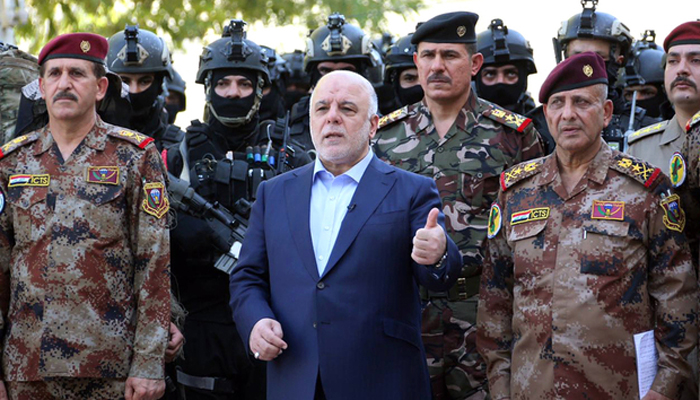Turkey and Iraq have recalled each others ambassadors and Iraq's prime minister warned of a "regional war" as tensions increased over a vote by the Turkish parliament to continue stationing troops near Mosul.
Haider al-Abadi said on Wednesday that Turkey ran the risk of escalating violence in the region if it did not withdraw its troops from their base in Bashika, northern Iraq, where they have been stationed since late last year in what Turkey claims is a training detail for Iraqi soldiers.
Turkey cites the invitation of Massoud Barzani, the president of the autonomous Kurdish Regional Government (KRG), to justify the presence of its troops in the country's Kurdish-run north. Turkey and the KRG are allies, but Baghdad is opposed to the presence of Turkish forces.
"We have asked more than once the Turkish side not to intervene in Iraqi matters and I fear that the Turkish adventure could turn into a regional war," Abadi said.
"The Turkish leadership's behaviour is not acceptable and we don’t want to get into a military confrontation with Turkey."
Last week, the Turkish parliament voted to extend legislation to allow the Turkish military to continue deployment in Iraq and Syria for the purposes of combatting "terrorist" groups, including the Islamic State (IS).
In response, the Iraqi parliament on Tuesday voted to expel Turkish forces from the country.
As a detail of the vote, MPs requested a note be sent to Turkey's ambassador in Baghdad describing the Turkish troops as "hostile occupying forces" in Iraq.
The two votes appear to have kicked off a diplomatic row between the two countries - Iraq summoned the Turkish ambassador following the parliamentary vote, with Turkey doing likewise shortly after.
Turkey's foreign ministry slammed the vote in the Iraqi parliament, reiterating in a statement on Wednesday that it was in Iraq for the purposes of helping the Iraqi people and criticising the Iraqi government for its "sectarian" approach to fighting IS in the north.
"Turkey has lost thousands of citizens due to the terror threat from Iraq and has defended Iraq's territorial integrity, sovereignty, stability and security taking huge political and economic risks although it has been affected directly by the instability caused by the sectarian approach of Iraq," the statement said.
The Turkish military claimed in a statement in early September that its operations in Iraq had eliminated significant numbers of IS forces, including 602 militants, 416 buildings used by IS, 83 armored vehicles and 17 artillery positions.
Turkey has previously noted its willingness to participate in the long-mooted assault on the northern city of Mosul, currently the last remaining IS strongold in Iraq.
It has claimed that the make-up of Iraq's anti-IS forces, which are heavily reliant on Kurdish Peshmerga and the Shia-majority Popular Mobilisation Units (PMUs), will exacerbate sectarian tensions and drive more Iraqis into the hands of IS and other like-minded groups.
On Wednesday, Turkish daily Haberturk cited a high-level Turkish government source as saying Turkey will get involved in the fight for Mosul some time after 20 October. He added that any issue with the Baghdad government would be averted by citing the invitation of Barzani.
The PMUs condemned as "racist" comments by Turkish President Recep Tayyip Erdogan, in which he said that after Mosul was liberated from IS, "only Sunni Arabs, Turkmen and Sunni Kurds should remain there".
"Nobody has the right - especially not leaders of foreign countries - to impose a discriminatory policy on any part of Iraq and decide who can and cannot return to their homes," said a statement released by the PMU media team.
IS has lost most of its territory in Iraq and many commentators have predicted the group's ultimate defeat in the country could be just around the corner.
Iraqi politicians have been keen to emphasise, however, that the coalition of actors involved in the operation will not be driven by a sectarian agenda, as reports have filtered out of abuses committed by irregular forces.
The PMUs, while containing Sunni and Christian units, are overwhelmingly dominated by Shia groups, some of which are strongly linked to Iran and have been accused of pursuing an anti-Sunni agenda and of dealing out collective punishment to Iraqi Sunnis.
Speaking at the Royal United Services Institute in September, the Iraqi foreign minister, Ibrahim al-Jafaari, attempted to allay fears that the push on Mosul would alienate the local populace or that the forces involved would pursue their own agendas.
“I do not deny that the actions by one person here or there or a small group of people here or there," he said.
However he said that "the Sunni and Shia community are well and have the trust of each other”.
He said that the "military operation is based on Iraqi forces" and not driven by a religious or separatist agenda.
“I lived many years in... Mosul and I realised from being close how the Mosul community deals with other nationalities and other entities."







Comments